The Sandwich Maker Market is estimated to be valued at USD 3.6 billion in 2025 and is projected to reach USD 5.5 billion by 2035, registering a compound annual growth rate (CAGR) of 4.4% over the forecast period. The data suggests a steady market share gain over the forecast period, with incremental value increases indicating consistent demand growth. Annual values rise gradually, from USD 3.6 billion in 2025 to USD 3.8 billion in 2026, followed by continuous growth reaching USD 5.5 billion in 2035.
This steady upward trend points to positive market expansion without significant volatility or contraction phases. No periods of decline or stagnation are evident, implying that the market is successfully capturing additional share or expanding overall market size.
The consistent increments highlight gradual acceptance and adoption of sandwich maker products, possibly due to increasing consumer interest and product innovations. The lack of sharp spikes or dips reflects stable competitive dynamics and a balanced supply-demand relationship.
This stability reduces risk for investors and stakeholders while indicating sustained market potential. The Sandwich Maker Market shows clear market share gain driven by steady growth rather than rapid surges. The data reflects a mature but expanding sector where growth is predictable, supporting long-term investment confidence. The market share erosion appears unlikely, given the stable yearly increases observed across the decade.
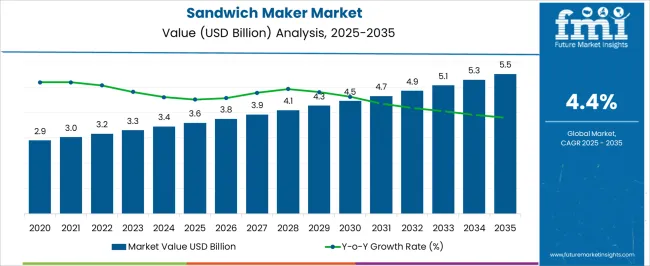
| Metric | Value |
|---|---|
| Sandwich Maker Market Estimated Value in (2025 E) | USD 3.6 billion |
| Sandwich Maker Market Forecast Value in (2035 F) | USD 5.5 billion |
| Forecast CAGR (2025 to 2035) | 4.4% |
The sandwich maker market is witnessing steady demand, fueled by changing lifestyles, increased preference for home-cooked meals, and rising demand for compact, energy-efficient kitchen appliances. Urbanization and time-constrained consumer routines have encouraged the use of convenient breakfast and snack preparation devices. The integration of modern design aesthetics with multifunctional features is further strengthening adoption in both developed and emerging economies.
Manufacturers are focusing on innovation in heating technology, easy-clean features, and portability to address evolving consumer needs. The proliferation of e-commerce platforms and retail partnerships is enhancing product accessibility and visibility.
Sustainability trends are also influencing material choices, with increased attention to non-toxic coatings and recyclable components. As residential and personal use categories expand, the market is expected to benefit from rising consumer spending on kitchen automation and space-saving culinary tools.
The sandwich maker market is segmented by product type, material, application, price, mobility, distribution channel, and geographic regions. By product type, the sandwich maker market is divided into Four-triangle sandwich makers, Panini press sandwich makers, Flat surface sandwich makers, and Other (Waffle sandwich makers). The sandwich maker market is classified by material into Non-Stick coating, Stainless steel, Ceramic coating, and Other (aluminum). Based on the application, the sandwich maker market is segmented into Residential and Commercial.
The sandwich maker market is segmented by price into Medium, Low, and High. The sandwich maker market is segmented by mobility into Countertop and Portable. The distribution channel of the sandwich maker market is segmented into Offline, Supermarkets, Kitchenware stores, Specialty appliance stores, Online, E-commerce platforms, and company websites.
Regionally, the sandwich maker industry is classified into North America, Latin America, Western Europe, Eastern Europe, Balkan & Baltic Countries, Russia & Belarus, Central Asia, East Asia, South Asia & Pacific, and the Middle East & Africa.
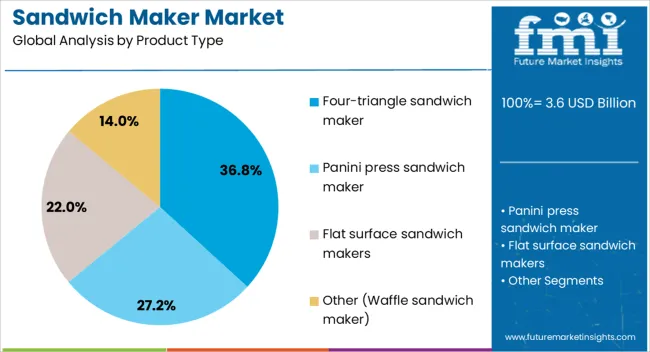
The four-triangle sandwich maker segment is projected to hold 36.80% of the total market share in 2025, establishing it as the leading product type. This dominance is being driven by its ease of use, consistent heating performance, and suitability for compact household use.
The format supports equal portioning and faster preparation, making it ideal for busy households and small kitchens. Consumers prefer this design due to its ability to deliver uniformly toasted sandwiches with minimal spillage.
The product’s affordability and compatibility with a variety of bread types and fillings have contributed to its wide appeal. Manufacturers continue to prioritize this configuration in mid-range offerings, balancing efficiency and cost, thereby reinforcing its leadership across price-sensitive segments.
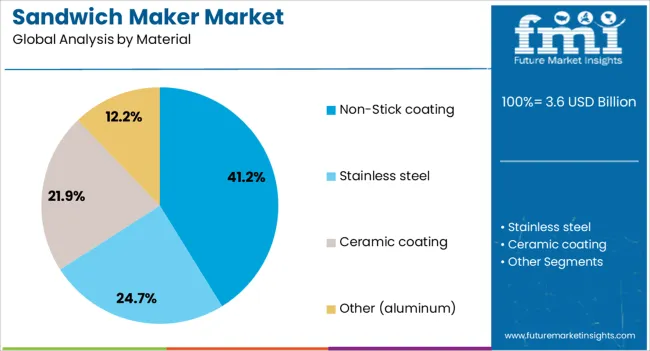
Non-stick coating materials are expected to account for 41.20% of the sandwich maker market revenue in 2025, placing this material type at the forefront. This segment’s growth has been supported by consumer demand for easy-clean, low-oil cooking surfaces that maintain food quality and hygiene.
The durability and heat-resistance of non-stick coatings enhance product lifespan while reducing the need for excessive maintenance. Improvements in coating formulations, particularly the shift toward PFOA-free and food-safe variants, have reinforced consumer confidence.
These coatings also contribute to energy efficiency by enabling faster heat transfer. As health-conscious cooking practices become mainstream, non-stick surfaces remain a preferred choice for daily-use kitchen appliances like sandwich makers.
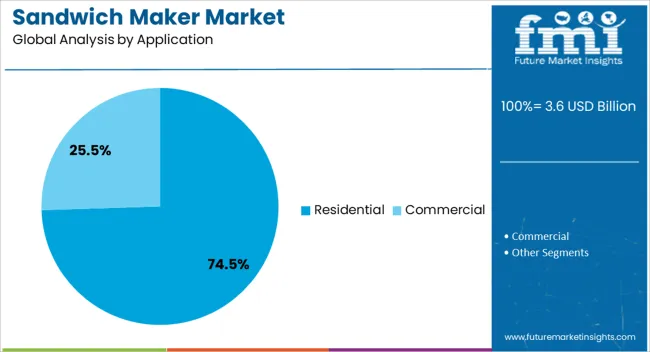
The residential segment is forecast to dominate the sandwich maker market with a 74.50% share in 2025, making it the primary application area. This leadership is attributed to increasing household penetration of electric kitchen appliances and the rising popularity of at-home meal preparation.
Compact form factors, ease of use, and affordability have positioned sandwich makers as essential appliances in modern homes, especially in urban areas. The growing culture of quick breakfasts and snack meals has further solidified residential demand.
Marketing efforts focused on gifting, seasonal promotions, and bundled offerings have also boosted product adoption. As single-person households and nuclear families continue to grow, residential usage is expected to sustain strong demand over the long term.
The sandwich maker market has expanded significantly due to growing consumer demand for convenient and quick meal preparation solutions. Increasing urban lifestyles and busy schedules have encouraged the adoption of small kitchen appliances that enable fast cooking with minimal effort. Sandwich makers provide an easy way to prepare a variety of hot sandwiches and snacks, appealing to diverse age groups and culinary preferences. Technological improvements in design, such as non-stick surfaces, adjustable temperature controls, and compactness, have enhanced user experience. Rising penetration of modern retail channels, including e-commerce, has further boosted market availability.
Consumers increasingly seek convenient appliances that facilitate healthy and quick meal preparation at home. Sandwich makers enable the use of fresh ingredients, allowing control over nutritional content compared to eating out or processed foods. Busy professionals, students, and families benefit from the time-saving aspect and ease of use. The trend toward on-the-go eating and snacking has also contributed to steady sales. Additionally, growing interest in customized recipes and versatile cooking options has pushed manufacturers to introduce sandwich makers with interchangeable plates and multi-functionality, catering to varied culinary preferences and expanding product appeal across different consumer segments.
Advancements in sandwich maker design focus on enhancing convenience and cooking performance. Features like non-stick coated plates reduce cleaning time, while adjustable temperature controls allow customization for different bread types and fillings. Compact, lightweight models suit small kitchens and travel needs. Some products offer multi-plate options for grilling, toasting, or waffle making, increasing appliance versatility. Safety features such as cool-touch handles and auto shut-off functions have improved user confidence. Manufacturers are also experimenting with energy-efficient heating elements and stylish aesthetics to attract design-conscious buyers. These improvements have collectively contributed to better user satisfaction and repeat purchases.
The growth of modern retail formats and e-commerce platforms has increased sandwich maker accessibility worldwide. Online marketplaces offer extensive product selections, competitive pricing, and detailed customer reviews, influencing purchase decisions positively. Retail chains and specialty stores have expanded shelf space for small kitchen appliances, encouraging impulse buying and gift purchases. Promotional campaigns and bundled offers during festivals and sales events have stimulated demand further. Increased internet penetration and smartphone usage in emerging markets have opened new customer bases. The combination of convenient shopping options and broad product variety has accelerated market penetration across urban and semi-urban regions globally.
The sandwich maker market faces intense competition among manufacturers ranging from established appliance brands to emerging local players. Price sensitivity among consumers, especially in developing regions, has led to aggressive pricing strategies and the launch of budget-friendly models. Differentiation through added features, design, and brand reputation plays a vital role in consumer choice. The availability of multifunctional kitchen devices offering grilling, baking, and cooking capabilities challenges standalone sandwich maker sales. Supply chain fluctuations and raw material cost changes impact pricing and profitability. Manufacturers continue to focus on cost optimization, product innovation, and strategic marketing to maintain market share amid competitive pressures.
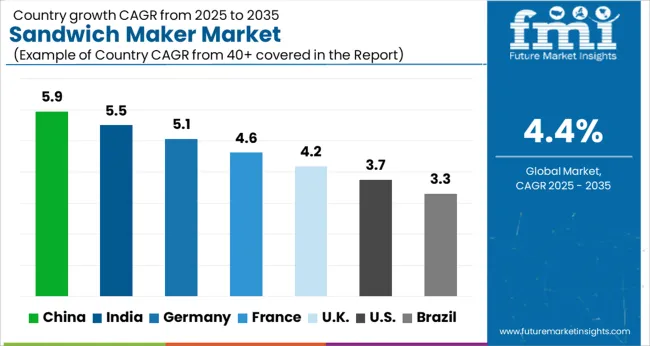
The market is expected to grow at a CAGR of 4.4% between 2025 and 2035, driven by rising demand for convenient kitchen appliances and changing consumer lifestyles. China leads with a 5.9% CAGR, supported by large-scale manufacturing and growing urban households. India follows at 5.5%, fueled by increasing adoption of home cooking appliances and rising disposable incomes.
Germany, growing at 5.1%, benefits from consumer preference for compact and energy-efficient kitchen devices. The UK, at 4.2%, experiences steady demand from convenience-focused consumers. The USA, with a 3.7% CAGR, reflects growth influenced by innovation in appliance features and smart kitchen trends. This report includes insights on 40+ countries; the top markets are shown here for reference.
The sandwich maker industry in China is expected to grow at a CAGR of 5.9% from 2025 to 2035, fueled by rising consumer interest in convenient cooking appliances. Expansion of the middle-class population and changing eating habits have increased demand for easy-to-use kitchen devices. Local manufacturers are innovating with multifunctional sandwich makers that offer grilling, toasting, and baking features. E-commerce platforms have broadened market access, while competitive pricing strategies support growth. Increasing health consciousness is encouraging adoption of home cooking appliances that promote quick meal preparation. Domestic brands such as Midea and Supor lead the market with diversified product portfolios and strong distribution networks.
In India, sandwich maker sales are forecast to grow at a CAGR of 5.5% from 2025 to 2035, driven by rising urban lifestyles and growing preference for quick meal solutions. Increasing disposable income and expansion of organized retail sectors have enhanced product availability. Manufacturers focus on compact, energy-efficient designs tailored to small kitchens. Consumer awareness campaigns promoting healthy homemade snacks have supported market expansion. Local and international brands compete with differentiated features, such as non-stick surfaces and temperature controls, to capture market share.
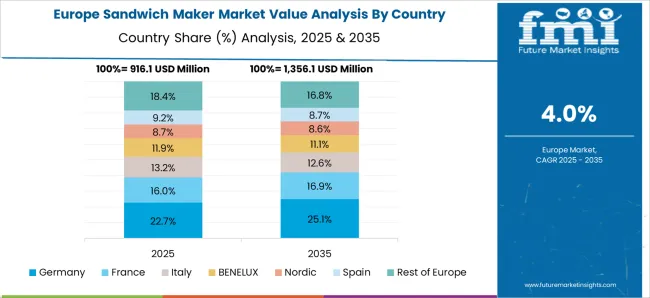
Sales of sandwich makers in Germany are expected to rise at a CAGR of 5.1% from 2025 to 2035, supported by demand for efficient kitchen gadgets and increasing interest in quick meal preparation. High emphasis on energy efficiency and product durability drives consumer preferences. Manufacturers invest in premium models with advanced heating elements and safety features. The rise of remote work has boosted demand for convenient cooking devices, with sandwich makers seen as a practical solution for home meals. Sustainable material usage is increasingly valued by environmentally conscious consumers.
The United Kingdom market for sandwich makers is projected to grow at a CAGR of 4.2% between 2025 and 2035, influenced by busy lifestyles and rising interest in healthy eating. The popularity of quick breakfast options and portable cooking appliances supports sales. Product innovation focuses on versatile devices capable of preparing sandwiches, paninis, and waffles. Retailers emphasize seasonal promotions and online sales channels to boost purchases. Sustainability features such as recyclable materials and energy-saving modes are becoming key differentiators in consumer choices.
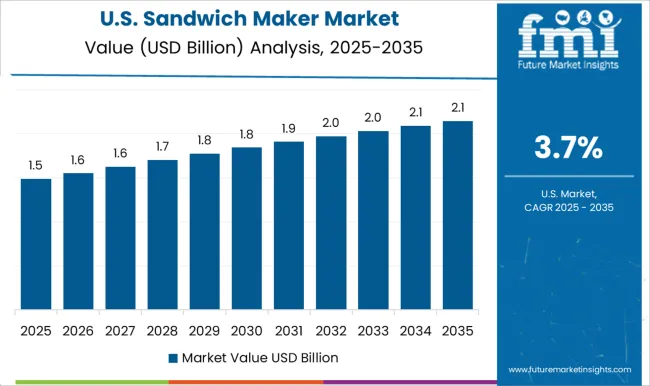
In the United States, the demand for sandwich makers is forecast to increase at a CAGR of 3.7% from 2025 to 2035, reflecting steady consumer interest in convenient kitchen appliances. Emphasis on healthy eating habits has driven adoption of devices that facilitate homemade meals and snacks. Product differentiation includes smart features such as temperature control and automatic timers. Large retail chains and online platforms compete to offer diverse models with competitive pricing. Growing adoption of single-person households and small family units sustains market demand.
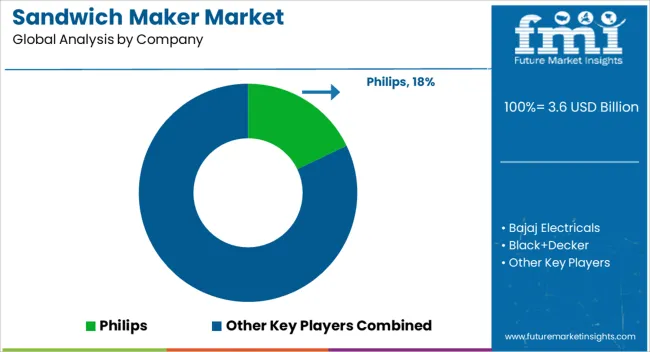
The market is dominated by well-established consumer electronics brands known for combining convenience, durability, and innovative features in their products. Philips leads with a strong global presence and models that incorporate advanced temperature control and non-stick plates. Bajaj Electricals caters primarily to the South Asian market, offering cost-effective yet reliable sandwich makers suitable for daily household use.
Black+Decker and Breville focus on premium segments, emphasizing sleek design and multifunctional appliances that appeal to tech-savvy consumers. Cuisinart and George Foreman capitalize on brand loyalty by providing versatile kitchen solutions that go beyond sandwich making, integrating grilling and baking functionalities. Hamilton Beach and Kenwood maintain competitive product lines featuring compact designs and energy efficiency, addressing space-conscious buyers.
Morphy Richards and Oster target value-driven consumers through affordable models with essential features and easy maintenance. Panasonic, Prestige, Russell Hobbs, Sunbeam, and Tefal reinforce their market share by launching frequent product updates, incorporating safety features, and expanding retail availability. Marketing strategies often include collaborations with retailers, digital promotions, and offering extended warranties to increase consumer confidence.
Barriers to entry include established brand dominance, economies of scale in manufacturing, patent protections on design and heating technologies, and extensive distribution networks. New entrants face challenges in creating differentiated products while maintaining competitive pricing in a mature and price-sensitive market.
| Item | Value |
|---|---|
| Quantitative Units | USD 3.6 Billion |
| Product Type | Four-triangle sandwich maker, Panini press sandwich maker, Flat surface sandwich makers, and Other (Waffle sandwich maker) |
| Material | Non-Stick coating, Stainless steel, Ceramic coating, and Other (aluminum) |
| Application | Residential and Commercial |
| Price | Medium, Low, and High |
| Mobility | Countertop and Portable |
| Distribution Channel | Offline, Supermarkets, Kitchenware stores, Specialty appliance stores, Online, E-commerce platforms, and Company website |
| Regions Covered | North America, Europe, Asia-Pacific, Latin America, Middle East & Africa |
| Country Covered | United States, Canada, Germany, France, United Kingdom, China, Japan, India, Brazil, South Africa |
| Key Companies Profiled | Philips, Bajaj Electricals, Black+Decker, Breville, Cuisinart, George Foreman, Hamilton Beach, Kenwood, Morphy Richards, Oster, Panasonic, Prestige, Russell Hobbs, Sunbeam, and Tefal |
| Additional Attributes | Dollar sales by product type and distribution channel, demand dynamics across residential kitchens, commercial foodservice, and institutional cafeterias, regional trends in adoption across North America, Europe, and Asia-Pacific, innovation in temperature control, non-stick coating technologies, and multifunctional appliance integration, environmental impact of energy consumption, material recyclability, and electronic waste, and emerging use cases in smart kitchen ecosystems, portable cooking solutions, and customizable sandwich preparation systems. |
The global sandwich maker market is estimated to be valued at USD 3.6 billion in 2025.
The market size for the sandwich maker market is projected to reach USD 5.5 billion by 2035.
The sandwich maker market is expected to grow at a 4.4% CAGR between 2025 and 2035.
The key product types in sandwich maker market are four-triangle sandwich maker, panini press sandwich maker, flat surface sandwich makers and other (waffle sandwich maker).
In terms of material, non-stick coating segment to command 41.2% share in the sandwich maker market in 2025.






Our Research Products

The "Full Research Suite" delivers actionable market intel, deep dives on markets or technologies, so clients act faster, cut risk, and unlock growth.

The Leaderboard benchmarks and ranks top vendors, classifying them as Established Leaders, Leading Challengers, or Disruptors & Challengers.

Locates where complements amplify value and substitutes erode it, forecasting net impact by horizon

We deliver granular, decision-grade intel: market sizing, 5-year forecasts, pricing, adoption, usage, revenue, and operational KPIs—plus competitor tracking, regulation, and value chains—across 60 countries broadly.

Spot the shifts before they hit your P&L. We track inflection points, adoption curves, pricing moves, and ecosystem plays to show where demand is heading, why it is changing, and what to do next across high-growth markets and disruptive tech

Real-time reads of user behavior. We track shifting priorities, perceptions of today’s and next-gen services, and provider experience, then pace how fast tech moves from trial to adoption, blending buyer, consumer, and channel inputs with social signals (#WhySwitch, #UX).

Partner with our analyst team to build a custom report designed around your business priorities. From analysing market trends to assessing competitors or crafting bespoke datasets, we tailor insights to your needs.
Supplier Intelligence
Discovery & Profiling
Capacity & Footprint
Performance & Risk
Compliance & Governance
Commercial Readiness
Who Supplies Whom
Scorecards & Shortlists
Playbooks & Docs
Category Intelligence
Definition & Scope
Demand & Use Cases
Cost Drivers
Market Structure
Supply Chain Map
Trade & Policy
Operating Norms
Deliverables
Buyer Intelligence
Account Basics
Spend & Scope
Procurement Model
Vendor Requirements
Terms & Policies
Entry Strategy
Pain Points & Triggers
Outputs
Pricing Analysis
Benchmarks
Trends
Should-Cost
Indexation
Landed Cost
Commercial Terms
Deliverables
Brand Analysis
Positioning & Value Prop
Share & Presence
Customer Evidence
Go-to-Market
Digital & Reputation
Compliance & Trust
KPIs & Gaps
Outputs
Full Research Suite comprises of:
Market outlook & trends analysis
Interviews & case studies
Strategic recommendations
Vendor profiles & capabilities analysis
5-year forecasts
8 regions and 60+ country-level data splits
Market segment data splits
12 months of continuous data updates
DELIVERED AS:
PDF EXCEL ONLINE
Portable Sandwich Maker Market Size and Share Forecast Outlook 2025 to 2035
Sandwich Panel System Market Size and Share Forecast Outlook 2025 to 2035
Sandwich Containers Market Insights & Industry Analysis 2023-2033
Sandwich Preparation Refrigerators Market
Ice Maker Machines Market
Soda Maker Market Size and Share Forecast Outlook 2025 to 2035
Cocoa Maker Market Size, Growth, and Forecast 2025 to 2035
Waffle Maker Market Size and Share Forecast Outlook 2025 to 2035
Yogurt Maker Market – Trends, Growth & Forecast 2025 to 2035
Popcorn Makers Market
Ice-cream Maker Market
PU-PIR-PUR Sandwich Panel for Cold Storage Market Size and Share Forecast Outlook 2025 to 2035
Facial Mask Maker Market Size and Share Forecast Outlook 2025 to 2035
Cotton Candy Maker Market Forecast and Outlook 2025 to 2035
External Pacemakers Market Size and Share Forecast Outlook 2025 to 2035
Examining Market Share Trends in the Cotton Candy Maker Industry
Undercounter Ice Makers Market - Space-Saving Solutions & Market Outlook 2025 to 2035
Coffee Decoction Maker Market
Prefabricated Composite Sandwich Panels Market Size and Share Forecast Outlook 2025 to 2035
Aluminum Foil Peel-Off Ends Maker Market Size and Share Forecast Outlook 2025 to 2035

Thank you!
You will receive an email from our Business Development Manager. Please be sure to check your SPAM/JUNK folder too.
Chat With
MaRIA